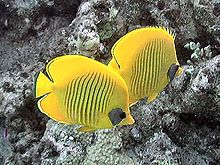- Bluecheek butterflyfish
-
Blue-cheeked butterflyfish Scientific classification Kingdom: Animalia Phylum: Chordata Class: Actinopterygii Order: Perciformes Family: Chaetodontidae Genus: Chaetodon (but see text) Subgenus: Rabdophorus Species: C. (R.) semilarvatus Binomial name Chaetodon (Rabdophorus) semilarvatus
Cuvier, 1831The blue-cheeked butterflyfish, Chaetodon semilarvatus, is a species of butterflyfish (family Chaetodontidae). It is found in the Red Sea and the Gulf of Aden, at depths of between 3 and 20 m.[1]
Its length is up to 23 cm (9.1 in). It is mostly yellow, with thin slate blue vertical lines on the sides and a slate blue cheek patch in lieu of the usual black eyestripe of most Chaetodon.
The blue-cheeked butterflyfish belongs to the large subgenus Rabdophorus which might warrant recognition as a distinct genus. In this group, it seems closest to a group containing the Blackback butterflyfish (C. melannotus), the spot-naped butterflyfish (C. oxycephalus), or the peculiar black-wedged butterflyfish (C. falcula) and Pacific double-saddle butterflyfish or "false falcula", (C. ulietensis). Though the present species does not share their white body with black on the back and caudal peduncle and even lacks the typical eyestripe of Chaetodon, it has the same tell-tale blue vertical lines as these species.[2]
Footnotes
References
- Fessler, Jennifer L. & Westneat, Mark W. (2007): Molecular phylogenetics of the butterflyfishes (Chaetodontidae): Taxonomy and biogeography of a global coral reef fish family. Mol. Phylogenet. Evol. 45(1): 50–68. doi:10.1016/j.ympev.2007.05.018 (HTML abstract)
- FishBase (2008): Chaetodon semilarvatus. Version of 2008-JUL-24. Retrieved 2008-SEP-01.
- Hsu, Kui-Ching; Chen, Jeng-Ping & Shao, Kwang-Tsao (2007): Molecular phylogeny of Chaetodon (Teleostei: Chaetodontidae) in the Indo-West Pacific: evolution in geminate species pairs and species groups. Raffles Bulletin of Zoology Supplement 14: 77-86. PDF fulltext
This Chaetodontidae article is a stub. You can help Wikipedia by expanding it.

